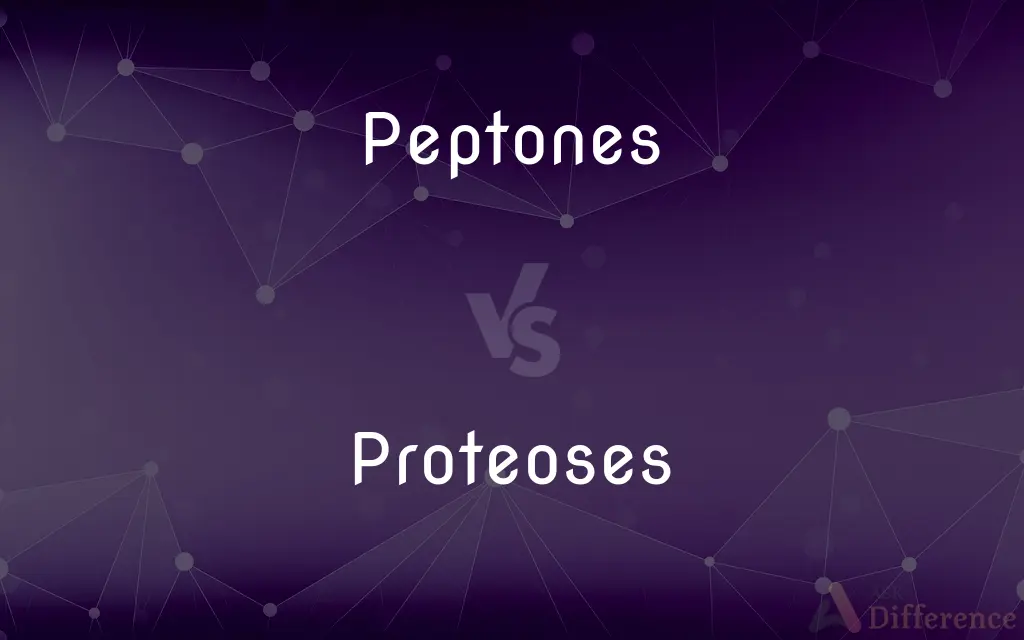Peptones vs. Proteoses — What's the Difference?
By Tayyaba Rehman — Published on November 6, 2023
Peptones are complex mixtures of amino acids and peptides resulting from protein hydrolysis, while proteoses are intermediate products of protein digestion that are less complex than peptones.

Difference Between Peptones and Proteoses
Table of Contents
ADVERTISEMENT
Key Differences
Peptones are the end products of protein digestion. They are complex mixtures formed when proteins undergo hydrolysis, breaking down into smaller amino acids and peptides. On the other hand, proteoses are not end products but intermediate ones. They form earlier in the protein digestion process than peptones, representing a middle stage in protein breakdown.
In the sequential breakdown of proteins, proteoses form after the initial action of proteolytic enzymes on proteins. These proteolytic enzymes then continue to act on the proteoses, converting them into peptones. This means that while proteoses are smaller than the original protein, they are larger and less broken down than peptones.
Both peptones and proteoses play essential roles in microbiology and are used in culture media to grow various microorganisms. Peptones, being more hydrolyzed, offer a richer source of nutrients for bacterial growth than proteoses. However, proteoses still provide essential nutrients and are often combined with peptones in certain media formulations.
In terms of solubility, peptones are typically more soluble than proteoses. This is due to their smaller size and higher degree of hydrolysis, making them more amenable to dissolution in water. Proteoses, being larger, can sometimes be less soluble and may precipitate out of solution under certain conditions.
Comparison Chart
Nature
End products of protein digestion
Intermediate products of protein digestion
ADVERTISEMENT
Complexity
Smaller amino acids and peptides
Larger peptides, less broken down than peptones
Use in Microbiology
Commonly used in culture media
Used less frequently but sometimes combined with peptones
Solubility
Typically more soluble
May be less soluble
Formation
Formed after proteoses in protein digestion
Formed before peptones in protein digestion
Compare with Definitions
Peptones
End products of protein hydrolysis.
Peptones provide essential nutrients in bacterial culture media.
Proteoses
Result from the initial action of proteolytic enzymes on proteins.
The first step in protein digestion yields proteoses.
Peptones
Highly soluble due to smaller size.
Due to their solubility, peptones are often used in liquid media.
Proteoses
Less hydrolyzed than peptones.
Compared to peptones, proteoses are larger and less broken down.
Peptones
Complex mixtures of amino acids and peptides.
The protein in meat when digested breaks down into peptones.
Proteoses
Intermediate products in protein digestion.
Proteoses form before peptones during enzymatic breakdown.
Peptones
Utilized in microbiology for microbial growth.
Peptones support the rapid growth of bacteria in labs.
Proteoses
Precursors to peptones in protein breakdown.
Continued enzymatic action converts proteoses into peptones.
Peptones
Formed from the further breakdown of proteoses.
Enzymatic action on proteoses produces peptones.
Proteoses
Sometimes used in combination with peptones in culture media.
Some microbial media formulations contain both proteoses and peptones.
Peptones
Any of various water-soluble protein derivatives formed by partial hydrolysis or digestion of proteins by an acid or enzyme, used in culture media in bacteriology.
Proteoses
Any of various water-soluble compounds that are produced during digestion by the hydrolytic breakdown of proteins.
Peptones
Plural of peptone
Proteoses
Plural of proteose
Common Curiosities
What are peptones?
They are the end products of protein hydrolysis, consisting of amino acids and peptides.
How do proteoses form?
They are intermediate products formed during the initial stages of protein digestion.
How do peptones support bacterial growth?
They offer a rich source of amino acids and peptides necessary for growth.
Are peptones more complex than proteoses?
No, peptones are less complex and more hydrolyzed than proteoses.
Are proteoses soluble?
They may be less soluble than peptones, depending on conditions.
Do all culture media contain peptones?
No, but many do because of the nutrients peptones provide for bacterial growth.
Can proteoses be further broken down?
Yes, they can be further hydrolyzed into peptones.
Why are peptones used in culture media?
They provide essential nutrients that promote microbial growth.
Which forms first, proteoses or peptones?
Proteoses form before peptones in the protein digestion process.
Share Your Discovery

Previous Comparison
Lightly vs. Slightly
Next Comparison
Commonwealth Games vs. Olympic GamesAuthor Spotlight
Written by
Tayyaba RehmanTayyaba Rehman is a distinguished writer, currently serving as a primary contributor to askdifference.com. As a researcher in semantics and etymology, Tayyaba's passion for the complexity of languages and their distinctions has found a perfect home on the platform. Tayyaba delves into the intricacies of language, distinguishing between commonly confused words and phrases, thereby providing clarity for readers worldwide.













































